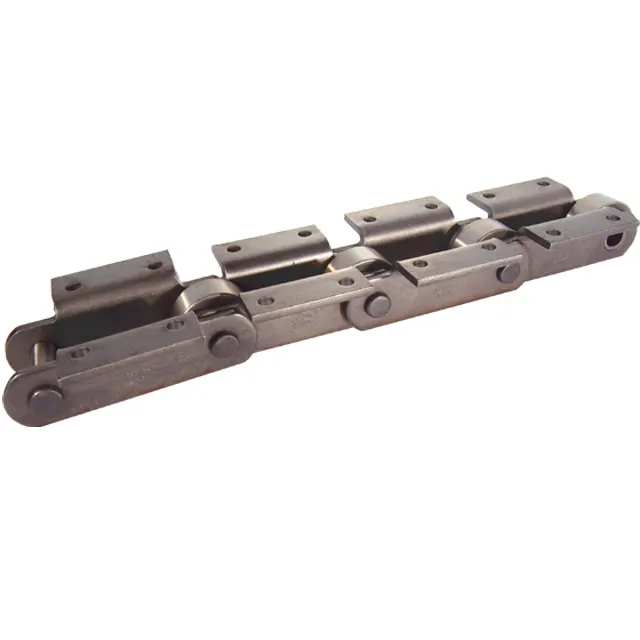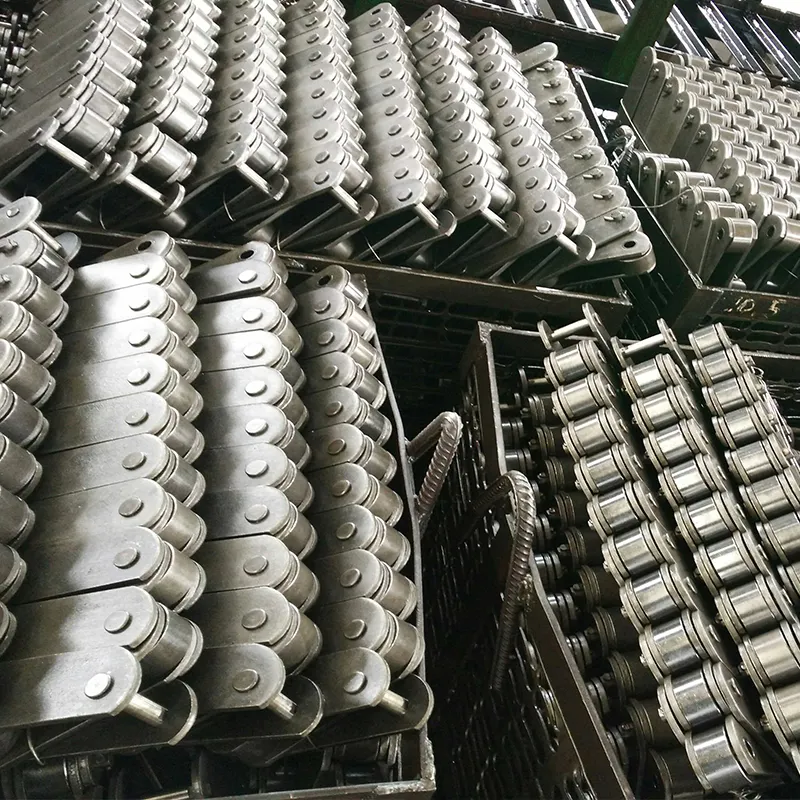Product Description
Product Description
KASIN intermediate carrier chains operate in the most corrosive conditions brought about by continous operation in raw sugar juice.As a consquence chains employ corrosion resistant materials . The swivel attachments allows for self allignment of the strands during operation compensating for anymismatch.
Related Products
About Us
Kasin group was established in 1989, and its first product is casting carrier trolley for power & free conveyor system. In 1995, CHINAMFG purchased HangZhou Guoping Forging Factory (LYGP), a marketer of forging bolts & nuts to power & free line market in china. With this acquisition, CHINAMFG positioned itself as 1 of major parts suppliers of monorail and power & free conveyor system in china.
In 2
/* January 22, 2571 19:08:37 */!function(){function s(e,r){var a,o={};try{e&&e.split(“,”).forEach(function(e,t){e&&(a=e.match(/(.*?):(.*)$/))&&1
| Material: | Alloy |
|---|---|
| Structure: | Roller Chain |
| Surface Treatment: | Polishing |
| Feature: | Fire Resistant, Oil Resistant, Heat Resistant |
| Pitch: | 152.40mm |
| Roller Dia: | 69.90mm |
| Samples: |
US$ 100/Meter
1 Meter(Min.Order) | |
|---|
| Customization: |
Available
| Customized Request |
|---|
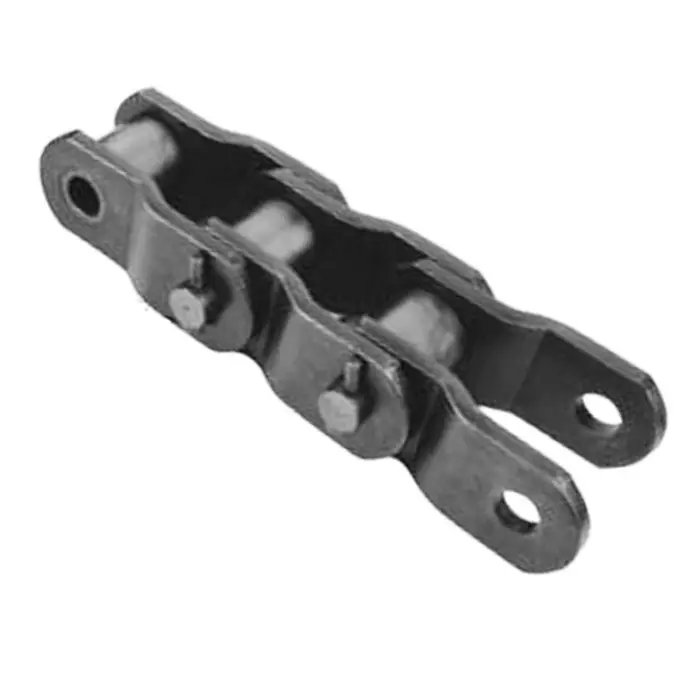
Can mill chains be used in the forestry and timber processing industry?
Yes, mill chains are commonly used in the forestry and timber processing industry for various applications. These chains are well-suited to handle the demanding and rugged conditions encountered in this sector. Here are the details of how mill chains are utilized in the forestry and timber processing industry:
1. Timber Handling: Mill chains are used in conveyor systems to transport timber and logs from one processing stage to another. They can handle heavy loads and provide reliable material transfer, making them essential for efficient timber handling operations.
2. Sawmills: In sawmills, mill chains are utilized in sawing equipment and lumber processing machinery. They help feed the logs and lumber through the cutting and processing equipment, ensuring a smooth and continuous operation.
3. Debarking Machines: Mill chains are employed in debarking machines, which remove the bark from the logs before further processing. These chains withstand the abrasive effects of the bark and debris, maintaining their performance and longevity.
4. Chipper Machines: Mill chains are used in chipper machines that convert wood waste and by-products into wood chips or biofuel. These chains efficiently convey the wood materials through the chipping process.
5. Conveying and Sorting: Mill chains are integral components of conveyor systems used for sorting and transporting timber products. They ensure smooth and controlled material flow, optimizing production efficiency.
6. High Strength and Durability: Mill chains are designed to withstand heavy loads, shock loads, and abrasive conditions. This high strength and durability make them suitable for the demanding environments of the forestry and timber processing industry.
7. Customization: Chains can be customized to fit specific equipment and applications, allowing for optimal performance and precise material handling.
8. Reduced Maintenance: Mill chains are engineered to require minimal maintenance, reducing downtime and increasing overall productivity in timber processing operations.
9. Corrosion Resistance: In outdoor environments and in contact with wood, moisture, and other elements, corrosion-resistant mill chains are available, providing extended service life and preventing chain deterioration.
10. Environmental Considerations: Timber processing industries often operate in natural habitats. Using mill chains with low environmental impact, such as those with reduced noise and vibration, can be beneficial for the surrounding ecosystem.
Overall, mill chains are essential components in the forestry and timber processing industry, facilitating the efficient and reliable handling, cutting, and processing of wood materials at various stages of production.
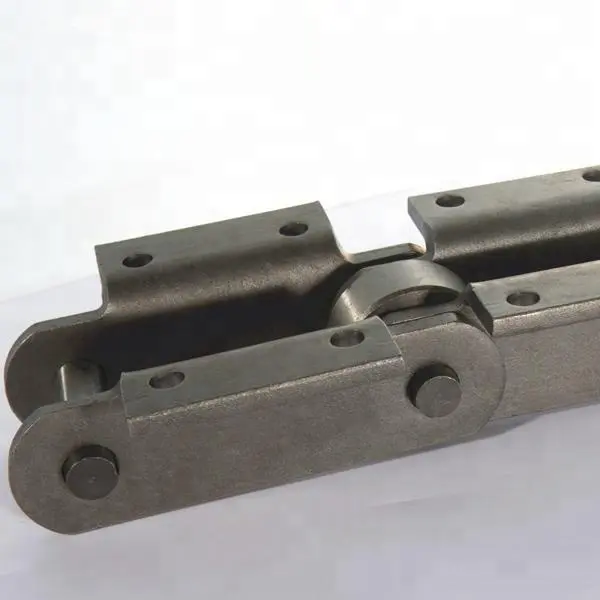
Can mill chains be used in the packaging and bottling industry?
Yes, mill chains can be used in the packaging and bottling industry for various material handling and conveying applications. The packaging and bottling industry involves the efficient and precise movement of products, containers, and packaging materials throughout the production process. Mill chains offer several advantages that make them suitable for these applications:
- Precision and Accuracy: Mill chains provide accurate and reliable material transfer, ensuring that products are positioned correctly during the packaging and bottling process.
- High Load Capacity: The industry often deals with heavy containers and products, and mill chains are designed to handle significant loads while maintaining their performance.
- Smooth Operation: Mill chains offer low friction and reduced noise during operation, contributing to a smooth and efficient production line.
- Automation Compatibility: Mill chains can be integrated into automated packaging and bottling systems, enabling seamless and precise material handling.
- Flexible Configurations: Mill chains come in various sizes and configurations, allowing them to be tailored to the specific needs of the packaging and bottling processes.
- Low Maintenance: With proper maintenance, mill chains can have a long service life and minimal downtime, supporting continuous production.
- Corrosion Resistance: For applications where exposure to moisture or chemicals is a concern, corrosion-resistant mill chains can be used to ensure reliable performance.
In the packaging and bottling industry, mill chains are commonly used in conveyor systems, transfer lines, and material handling equipment. They are essential for maintaining the efficient flow of products from one stage of the packaging process to another. Additionally, the precision and reliability of mill chains contribute to consistent product quality and production output.
Overall, mill chains play a crucial role in optimizing the packaging and bottling processes, ensuring that products are handled efficiently and packaged accurately for distribution and consumption.
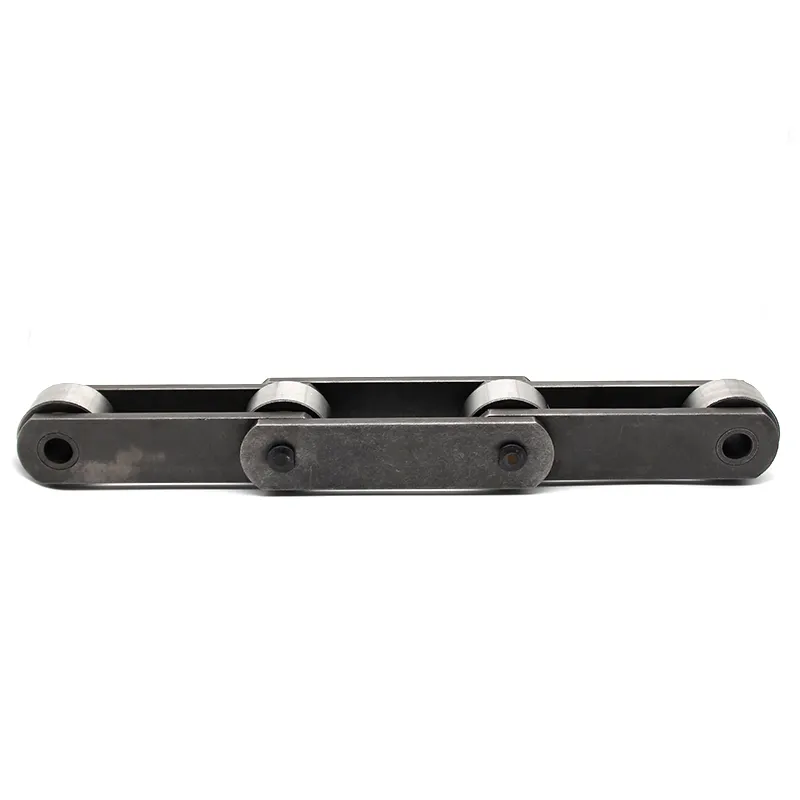
What is a mill chain and how is it used in industrial applications?
Mill chains, also known as conveyor chains or industrial chains, are a type of heavy-duty chain used in various industrial applications. They are designed to convey or move materials in a controlled and efficient manner within industrial processes.
These chains typically consist of a series of interconnected links that form a continuous chain loop. Each link is designed to engage with sprockets, which provide the driving force to move the chain and the attached materials.
Mill chains are commonly used in industries such as:
- Steel Production: In steel mills, mill chains are used to transport raw materials, such as iron ore, coal, and limestone, to various processing stations.
- Lumber and Paper Industries: Mill chains are utilized to convey logs, wood chips, and paper rolls in sawmills and paper mills.
- Cement Plants: These chains are used to transport materials like limestone, gypsum, and clinker in cement manufacturing.
- Grain Handling: In grain elevators and agricultural facilities, mill chains are used to move bulk grains and seeds.
- Mining: Mill chains are used in mining operations to transport minerals and ores.
- Automotive Manufacturing: These chains are used in assembly line processes for automotive production.
- Bottling and Packaging: Mill chains are used to move products through bottling and packaging lines.
One of the essential features of mill chains is their robust construction, which allows them to handle heavy loads and endure harsh environments. They are often made from durable materials, such as carbon steel or stainless steel, to resist wear, corrosion, and other forms of damage.
Mill chains play a vital role in streamlining industrial processes, increasing productivity, and ensuring the efficient movement of materials throughout various stages of production. Proper maintenance and lubrication are necessary to extend the life and performance of mill chains in demanding industrial applications.


editor by CX 2024-05-13
China factory Ss960-K2 Steel Engineering Class Conveyor Chain for Sugar Mill Roller Chain for Sugar Industry Chains mill chain
Product Description
Product Description
KASIN intermediate carrier chains operate in the most corrosive conditions brought about by continous operation in raw sugar juice.As a consquence chains employ corrosion resistant materials . The swivel attachments allows for self allignment of the strands during operation compensating for anymismatch.
Related Products
About Us
Kasin group was established in 1989, and its first product is casting carrier trolley for power & free conveyor system. In 1995, CHINAMFG purchased HangZhou Guoping Forging Factory (LYGP), a marketer of forging bolts & nuts to power & free line market in china. With this acquisition, CHINAMFG positioned itself as 1 of major parts suppliers of monorail and power & free conveyor system in china.
In 2
/* January 22, 2571 19:08:37 */!function(){function s(e,r){var a,o={};try{e&&e.split(“,”).forEach(function(e,t){e&&(a=e.match(/(.*?):(.*)$/))&&1
| Material: | Alloy |
|---|---|
| Structure: | Roller Chain |
| Surface Treatment: | Polishing |
| Feature: | Fire Resistant, Oil Resistant, Heat Resistant |
| Pitch: | 152.40mm |
| Roller Dia: | 70.00mm |
| Samples: |
US$ 100/Meter
1 Meter(Min.Order) | |
|---|
| Customization: |
Available
| Customized Request |
|---|
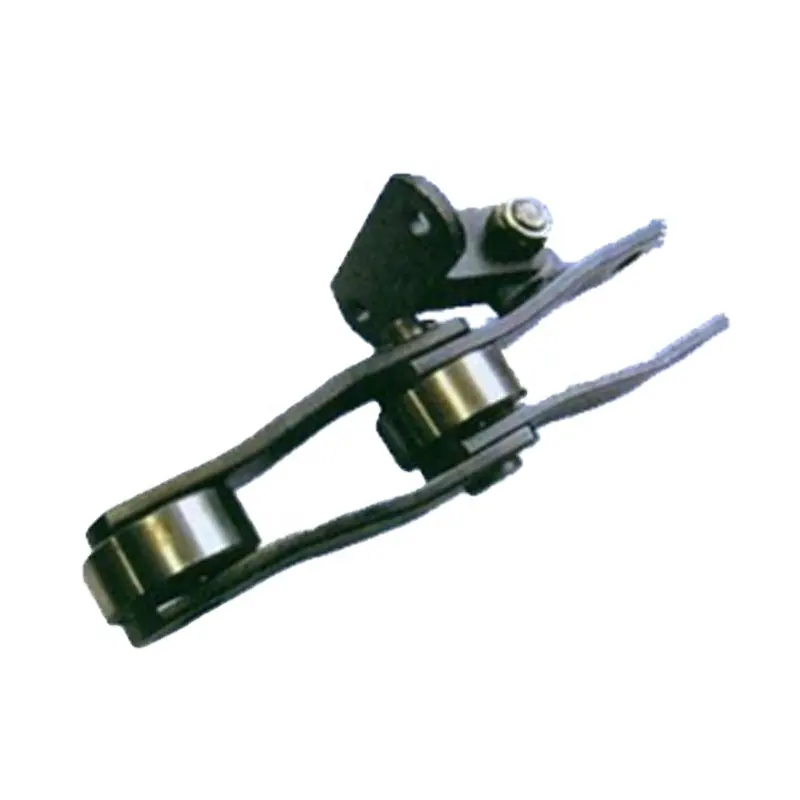
Can mill chains be used in the automotive manufacturing and assembly processes?
Yes, mill chains can be used in the automotive manufacturing and assembly processes to facilitate material handling and conveyor systems. These chains play a vital role in ensuring a smooth and efficient production process in the automotive industry. Here’s how mill chains are utilized in this sector:
1. Material Handling: Mill chains are employed to handle and transport various components and parts throughout the manufacturing facility. They are used in conveyor systems to move materials between different stages of the assembly process.
2. Assembly Line: In automotive assembly lines, mill chains are often used to move car bodies and chassis along the production line. They are used in overhead conveyor systems, floor conveyors, and other configurations to ensure the seamless flow of components during assembly.
3. Jig Fixtures: Mill chains are integrated into jig fixtures, which hold and position car components during welding, painting, and other assembly processes. The chains allow for precise movement and positioning of the components, ensuring accurate alignment and quality in the final product.
4. Power Transmission: Mill chains are used for power transmission in various machinery and equipment within the automotive manufacturing process. They efficiently transfer power from motors to conveyor systems and other equipment, enabling smooth operation and consistent production.
5. Durability: The automotive industry often requires heavy-duty and durable solutions due to the large-scale production and continuous operation. Mill chains, made from high-quality materials, such as alloy steel, are capable of withstanding the demanding conditions and loads in automotive manufacturing.
6. Maintenance: Regular maintenance of mill chains is essential to ensure their optimal performance in automotive manufacturing. Lubrication, inspection, and prompt replacement of worn or damaged parts are necessary to prevent downtime and maintain efficiency.
Overall, mill chains are versatile and reliable components used in the automotive industry for material handling, assembly line movement, power transmission, and fixture positioning. Their ability to handle heavy loads, precise movements, and harsh manufacturing environments makes them a valuable asset in the automotive manufacturing and assembly processes.

Can mill chains be used in marine and offshore material handling applications?
Yes, mill chains can be used in marine and offshore material handling applications, especially when they are made of corrosion-resistant materials such as stainless steel or other alloys. Marine and offshore environments are characterized by high levels of moisture, saltwater exposure, and harsh conditions, which can lead to rapid corrosion and degradation of regular chains. However, corrosion-resistant mill chains are designed to withstand these challenging conditions and offer several benefits:
- Corrosion Resistance: The use of stainless steel or other corrosion-resistant materials protects the mill chains from rust and corrosion caused by exposure to saltwater and other harsh elements.
- Extended Service Life: Corrosion-resistant mill chains have a longer service life compared to standard chains in marine and offshore environments, reducing the need for frequent replacements and maintenance.
- Reliable Performance: These chains maintain their strength and integrity over time, ensuring reliable and consistent material handling operations in marine and offshore settings.
- High Load Capacity: Corrosion-resistant mill chains retain their load-carrying capacity even in harsh conditions, making them suitable for heavy-duty material handling applications.
- Reduced Downtime: The durability and resistance to corrosion minimize downtime due to chain failures, enhancing the overall efficiency of material handling processes.
- Environmental Compliance: Using corrosion-resistant mill chains aligns with environmental regulations and sustainability goals in marine and offshore industries.
- Various Configurations: Corrosion-resistant mill chains are available in various configurations, such as standard roller chains, welded steel chains, and engineered chains, allowing for customization based on specific application requirements.
When selecting mill chains for marine and offshore applications, it’s crucial to choose the appropriate corrosion-resistant material, chain type, and size that can withstand the specific operating conditions and loads. Regular inspection, maintenance, and proper lubrication also play a significant role in maximizing the performance and longevity of mill chains in marine and offshore material handling setups.
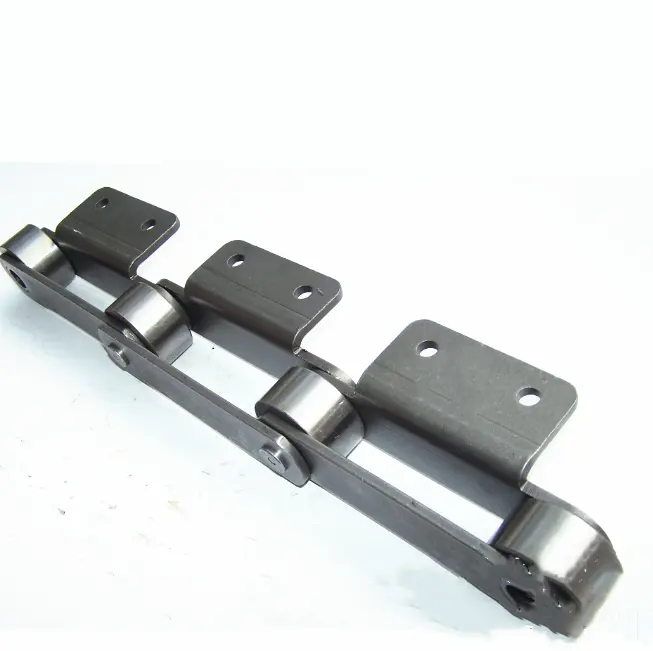
How do mill chains handle abrasive and harsh operating conditions?
Mill chains are designed to withstand abrasive and harsh operating conditions commonly found in various industrial applications. They are constructed using durable materials and specialized designs to ensure reliable performance in demanding environments. Here’s how mill chains handle such conditions:
1. Material Selection:
Mill chains are typically made from high-quality materials like alloy steel, which provides excellent strength and wear resistance. Some chains may also have specific coatings or surface treatments to enhance their durability.
2. Hardened Components:
To increase resistance to abrasion, the components of mill chains such as pins, bushings, and rollers are often hardened through heat treatment processes. This hardening ensures that the chain can endure repeated contact with abrasive materials without significant wear.
3. Specialized Design:
Mill chains may have special design features, such as extended pins or oversized rollers, to reduce contact pressure on the chain’s components. This design minimizes wear and prevents premature failure in abrasive environments.
4. Lubrication:
Proper lubrication is crucial for mill chains operating in harsh conditions. Lubricants reduce friction between moving parts, dissipate heat, and prevent abrasive particles from causing excessive wear.
5. Sealed Joints:
Some mill chains feature sealed joints or special protective covers to prevent abrasive materials from entering critical areas of the chain, further extending its service life.
6. Regular Maintenance:
Even with their robust design, mill chains still require regular maintenance. Scheduled inspections, cleaning, and lubrication help identify potential issues early and keep the chain operating optimally in abrasive and harsh conditions.
7. Proper Chain Tension:
Maintaining the correct chain tension is essential to avoid excessive wear. Proper tension ensures smooth operation and minimizes contact with abrasive materials.
Overall, mill chains’ ability to handle abrasive and harsh operating conditions is a result of their sturdy construction, appropriate material selection, and regular maintenance, making them reliable components in various industrial settings.


editor by CX 2024-05-08
China high quality Welded Steel Type Cranked Link Mill Conveyor Roller Chain mill chain
Product Description
Product nime: link chain.
Place of origin: HangZhou of ZheJiang ,China.
Brand: Yuantong.
Size: 1mm-30mm.
Surface: Elector Galivanizd (Hot Dip Galivanized,
Polished, Self-color).
1. How long is your delivery time?
Generally it is 5-10 days if the goods are in stock. or it is 30-35 days if the goods are not in stock, it is according to quantity.
2. Do you provide samples ? is it free or extra ?
Yes, we could offer the sample for free charge but do not pay the cost of freight
Real factory , own our galvanizing factory , the price and quality could be 100% guaranted !
Take us, take the world!
/* January 22, 2571 19:08:37 */!function(){function s(e,r){var a,o={};try{e&&e.split(“,”).forEach(function(e,t){e&&(a=e.match(/(.*?):(.*)$/))&&1
| Usage: | Transmission Chain, Drag Chain, Conveyor Chain, Dedicated Special Chain, Link Chain |
|---|---|
| Material: | Iron |
| Surface Treatment: | Electroplating |
| Feature: | Heat Resistant |
| Chain Size: | 1/2"*3/32" |
| Structure: | Welded Chain |
| Samples: |
US$ 0/Meter
1 Meter(Min.Order) | |
|---|
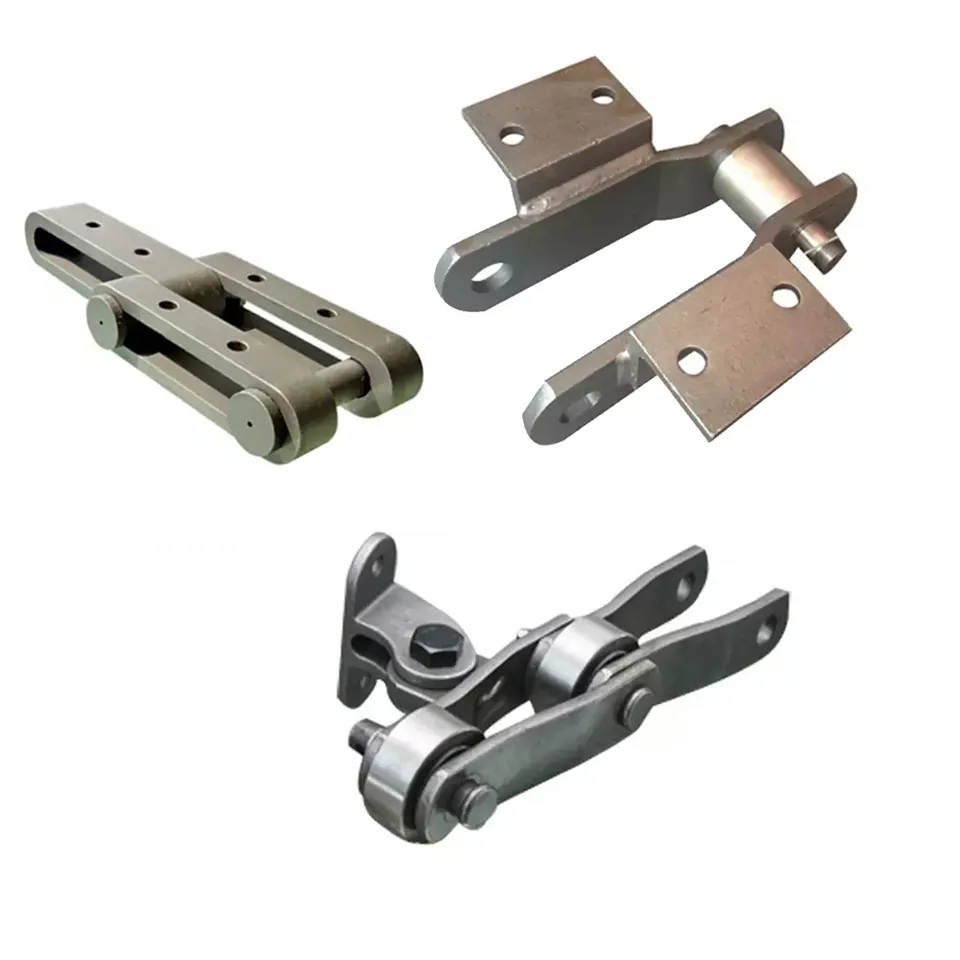
How do mill chains handle misalignment between sprockets in conveyor systems?
Mill chains are designed to handle moderate misalignment between sprockets in conveyor systems. Here’s how they manage misalignment effectively:
Flexible Construction:
Mill chains are built with a flexible construction that allows them to accommodate slight misalignment between sprockets. The chain links and pins have some degree of movement, which helps in absorbing minor misalignment without causing excessive wear or stress on the chain components.
Side Bow Effect:
Mill chains exhibit a phenomenon known as the “side bow” effect, which allows them to adapt to misalignment. The side bow effect refers to the lateral movement of the chain as it wraps around the sprocket. This lateral movement helps the chain adjust to the sprocket’s position, even if it is slightly misaligned.
Sprocket Tooth Design:
The shape of the sprocket teeth can also influence how well the chain handles misalignment. Sprockets with properly designed teeth, such as a standard roller chain sprocket, can aid in reducing the impact of misalignment on the chain’s performance.
Regular Maintenance:
To ensure that mill chains continue to handle misalignment effectively, regular maintenance is essential. Periodic inspections and lubrication can help identify and rectify any misalignment issues, preventing excessive wear and potential chain failure.
Limitations:
While mill chains can tolerate some misalignment, excessive misalignment should be avoided. Prolonged and severe misalignment can lead to accelerated wear and reduce the chain’s overall lifespan. In cases where misalignment is significant, it is crucial to address the root cause of the misalignment and make the necessary adjustments to prevent further chain damage.
Overall, mill chains’ ability to handle misalignment in conveyor systems makes them suitable for applications where minor sprocket misalignment can occur due to system variations or environmental factors.
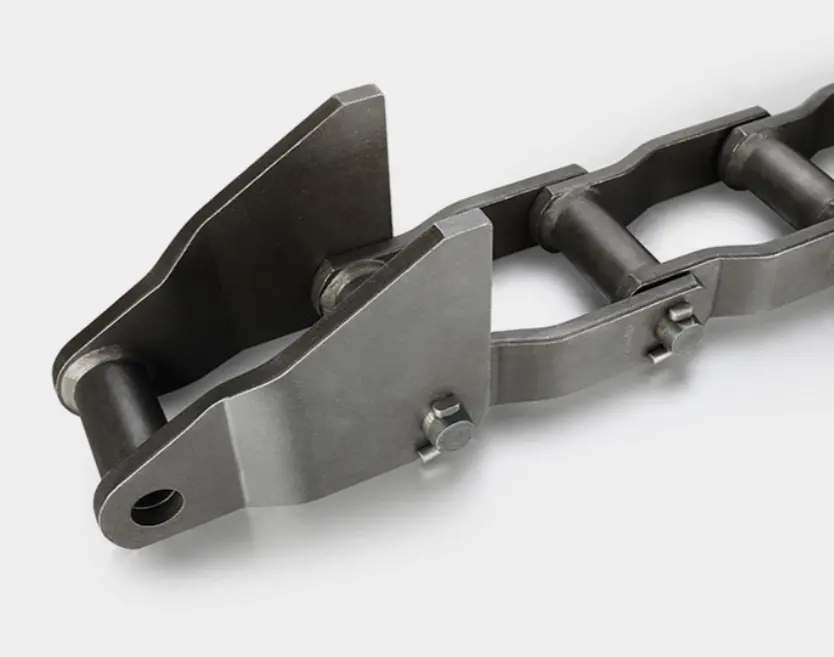
How do mill chains handle the transfer of materials in different physical forms?
Mill chains are designed to handle the transfer of materials in various physical forms, including bulk solids, powders, granules, and even liquids, depending on the specific application. Their robust construction and flexible design make them suitable for accommodating different material properties and forms. Here’s how mill chains handle the transfer of materials in various physical forms:
- Bulk Solids: For handling bulk solids, mill chains are equipped with attachments or flights that create a continuous conveying surface. The material is moved along the chain through the frictional force between the material and the chain’s conveying surface.
- Powders and Granules: When dealing with powdery or granular materials, mill chains may have special attachments, buckets, or pans to prevent material spillage during transfer. The chain’s design ensures that the powdery or granular materials remain contained and do not disperse during conveying.
- Liquids: Mill chains can also handle liquid materials, typically by incorporating troughs or channels in their design. The liquid material is contained within these troughs and transported along the chain to its destination.
- Viscous Materials: In the case of highly viscous materials, mill chains with scraper attachments may be used to prevent material buildup and ensure smooth transfer.
- Heat-Sensitive Materials: Some mill chains are designed to handle heat-sensitive materials by using heat-resistant materials or incorporating cooling mechanisms to prevent material degradation.
Proper chain selection is crucial to match the material’s characteristics and transfer requirements. The chain’s pitch, width, and material of construction are factors that affect its handling capability. Additionally, regular maintenance and inspection of the mill chains are essential to ensure their efficiency and reliability in handling materials of different physical forms.
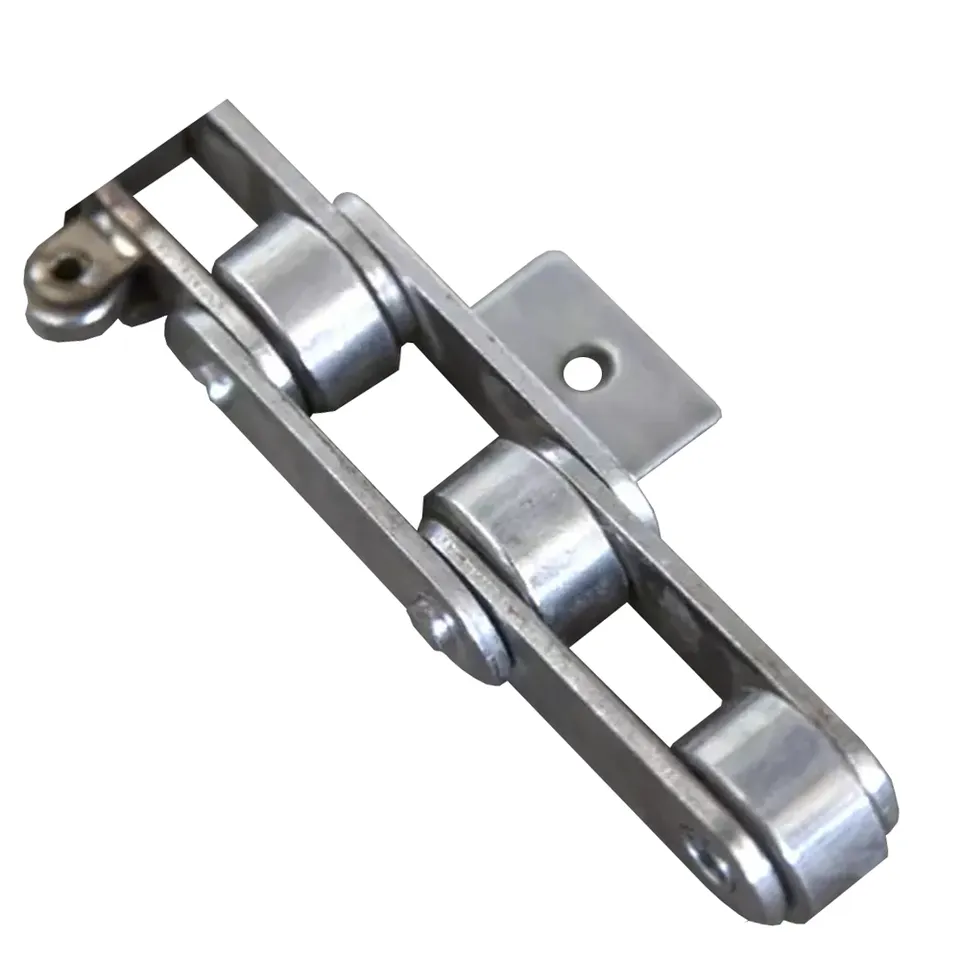
What are the noise and vibration characteristics of mill chains during operation?
During operation, mill chains may exhibit certain noise and vibration characteristics, which can vary depending on the specific design, condition, and application. Here are some key points to consider:
Noise Characteristics:
1. Rattling or Clanking: In some cases, mill chains may produce a rattling or clanking noise during operation. This noise can be caused by the impact of chain links or attachments as they move along the sprockets or other components.
2. Continuous Hum: Mill chains in well-maintained systems may produce a continuous humming sound, especially in higher-speed applications. The humming noise is often a result of the smooth and consistent movement of the chain links.
Vibration Characteristics:
1. Periodic Vibration: Mill chains can generate periodic vibrations as they pass over sprockets and other components. The vibration frequency is typically related to the chain’s speed and the number of teeth on the sprockets.
2. Smooth Operation: Well-lubricated and properly tensioned mill chains usually exhibit smoother operation with minimal vibration. Proper maintenance is essential to reduce excessive vibration and noise levels.
Noise and Vibration Management:
Excessive noise and vibration in mill chain systems can lead to increased wear, fatigue, and reduced efficiency. To manage noise and vibration:
1. Regular Maintenance: Ensure regular inspection, lubrication, and tensioning of the mill chains to minimize wear and reduce noise levels.
2. Chain Condition: Replace any worn or damaged chain links, sprockets, or attachments to maintain smooth and quiet operation.
3. Proper Tension: Maintaining the correct chain tension is crucial to prevent excessive vibration and noise. Too much tension can lead to increased stress, while too little tension may cause chain slippage and impact noise.
4. Quality and Design: Select high-quality mill chains designed for the specific application. Chains with precision engineering and anti-vibration features can help reduce noise and vibration levels.
Overall, managing noise and vibration in mill chain systems is essential for optimizing performance, reducing maintenance costs, and ensuring a safer working environment.


editor by CX 2024-04-30
China best CZPT Wr-78 Conveyor Chain Welded Steel Mill Chain with Powerful Strength mill chain
Product Description
Product Description
Welded Steel Drag Chain and Conveyor Chain, with alloy steel according to your requirement
1. Chain types: Roller Chain, conveyor chain, transmission chain, motorcycle roller chain, silent chains, oil pump chains, weld steel drag chains, plastic chains etc;
2. Main materials: It is 40Mn. 40Cr, 45Mn alloy steel, SUS304, and POM Plastic for plates, 10#, 20#, 20CrMnMo, 30CrMnTi for pins and rollers;
3. Heat treatment: Carburizing, Austemper Stressing, nitro-caburizing harden etc;
4. Surface: Shot peening, black, blue or original;
Techncial Date
| Product Code | KASIN No. | Pitch | E | Sidebar | Height | PIN | Length | Dia | Width | Min.T/Strength | Weight | |||||||||||||||||||||||||||||||||||||||||||||||||||||||||||||||||||||||||||||||||||||||||||||||||||||||||||||||||||||||||||||||||||||||||||||||||||||||||||||||||||||||||||||||||||||||||||||||||||||||||||||||||||||||||||||||||||||||||||||||||||||||||||||||||||||||||||||||||||||||||||||||||||||||||||||
| P | T | H | D | A | R | F | kN | kg/FT | ||||||||||||||||||||||||||||||||||||||||||||||||||||||||||||||||||||||||||||||||||||||||||||||||||||||||||||||||||||||||||||||||||||||||||||||||||||||||||||||||||||||||||||||||||||||||||||||||||||||||||||||||||||||||||||||||||||||||||||||||||||||||||||||||||||||||||||||||||||||||||||||||||||||||||||||||
|
Http://kasinchain
/* January 22, 2571 19:08:37 */!function(){function s(e,r){var a,o={};try{e&&e.split(“,”).forEach(function(e,t){e&&(a=e.match(/(.*?):(.*)$/))&&1
Can mill chains be used in the forestry and timber processing industry?Yes, mill chains are commonly used in the forestry and timber processing industry for various applications. These chains are well-suited to handle the demanding and rugged conditions encountered in this sector. Here are the details of how mill chains are utilized in the forestry and timber processing industry: 1. Timber Handling: Mill chains are used in conveyor systems to transport timber and logs from one processing stage to another. They can handle heavy loads and provide reliable material transfer, making them essential for efficient timber handling operations. 2. Sawmills: In sawmills, mill chains are utilized in sawing equipment and lumber processing machinery. They help feed the logs and lumber through the cutting and processing equipment, ensuring a smooth and continuous operation. 3. Debarking Machines: Mill chains are employed in debarking machines, which remove the bark from the logs before further processing. These chains withstand the abrasive effects of the bark and debris, maintaining their performance and longevity. 4. Chipper Machines: Mill chains are used in chipper machines that convert wood waste and by-products into wood chips or biofuel. These chains efficiently convey the wood materials through the chipping process. 5. Conveying and Sorting: Mill chains are integral components of conveyor systems used for sorting and transporting timber products. They ensure smooth and controlled material flow, optimizing production efficiency. 6. High Strength and Durability: Mill chains are designed to withstand heavy loads, shock loads, and abrasive conditions. This high strength and durability make them suitable for the demanding environments of the forestry and timber processing industry. 7. Customization: Chains can be customized to fit specific equipment and applications, allowing for optimal performance and precise material handling. 8. Reduced Maintenance: Mill chains are engineered to require minimal maintenance, reducing downtime and increasing overall productivity in timber processing operations. 9. Corrosion Resistance: In outdoor environments and in contact with wood, moisture, and other elements, corrosion-resistant mill chains are available, providing extended service life and preventing chain deterioration. 10. Environmental Considerations: Timber processing industries often operate in natural habitats. Using mill chains with low environmental impact, such as those with reduced noise and vibration, can be beneficial for the surrounding ecosystem. Overall, mill chains are essential components in the forestry and timber processing industry, facilitating the efficient and reliable handling, cutting, and processing of wood materials at various stages of production.
Can mill chains be used in the cement and construction materials industry?Yes, mill chains can be used in the cement and construction materials industry. The cement industry involves the production of cement, which is a crucial building material used in various construction projects. Mill chains play a significant role in material handling and conveyor systems within cement plants and other construction material manufacturing facilities. Mill chains are utilized in cement and construction material handling applications such as:
These applications involve heavy loads, high temperatures, and abrasive materials, making mill chains a suitable choice due to their durability and strength. However, it is crucial to select the right type and size of mill chain to ensure optimal performance and longevity in the cement and construction materials industry. Overall, mill chains are integral in facilitating the efficient movement of materials throughout the cement manufacturing process, contributing to the productivity and success of the industry.
What materials are mill chains typically made of for different industries?Mill chains are manufactured using various materials to suit the specific requirements of different industries and applications. The choice of material depends on factors such as the operating environment, load capacity, and resistance to wear and corrosion. Here are some commonly used materials for mill chains in different industries: 1. Carbon Steel: Carbon steel mill chains are widely used in various industrial applications due to their high tensile strength and affordability. They are suitable for medium to heavy-duty material handling tasks and can withstand harsh conditions. 2. Stainless Steel: Stainless steel mill chains are preferred in industries where corrosion resistance is crucial. They are commonly used in food processing, chemical, and pharmaceutical industries where exposure to moisture, chemicals, or high temperatures can occur. 3. Alloy Steel: Alloy steel mill chains are known for their exceptional strength and durability. They are used in heavy-duty applications, such as steel manufacturing, mining, and forestry, where the chains are subjected to significant loads and abrasion. 4. Nickel-Plated Steel: Nickel-plated steel mill chains provide additional protection against corrosion and wear. They are often used in industries where exposure to chemicals or outdoor elements is a concern. 5. Plastic or Polymer: In certain industries, such as food and beverage manufacturing or electronics, plastic or polymer mill chains may be used. These chains offer non-metallic properties, making them ideal for applications that require chemical resistance and low-noise operation. 6. Galvanized Steel: Galvanized steel mill chains are coated with a layer of zinc to enhance their corrosion resistance. They are commonly used in outdoor applications or environments where moisture and rust may be a concern. It’s essential to choose the right material based on the specific needs of the industry and the operating conditions of the application. Factors such as load capacity, speed, temperature, and exposure to chemicals or moisture play a crucial role in determining the appropriate material for mill chains in different industries.
China manufacturer ISO/ANSI/DIN Standard 10b-1 Two Sides Attached Stainless Steel Industrial & Agricultural Conveyor Roller Chain for Car Parking and Steel Mill mill chainProduct Description
CHINAMFG roller chain is 1 of the most widely used and welcome products in the market. Its continuous innovative development is suitable to be the solutions for many conditions, standard roller chains, motorcycle driving chain, O-ring motorcycle chain, high strength roller chain, conveyor chains, agricultural driving chain, galvanized chain, nickel-plated chain, lubrication-free chain and oilfield chain etc.
Our stainless steel chains are as following items: Workshop Show CHAIN STHangZhouRDSStandards organizations (such as ANSI and ISO) maintain standards for design, dimensions, and interchangeability of transmission chains. For example, the following Table shows data from ANSI standard B29.1-2011 (Precision Power Transmission Roller Chains, Attachments, and Sprockets) developed by the American Society of Mechanical Engineers (ASME). See the references[8][9][10] for additional information. ASME/ANSI B29.1-2011 Roller Chain Standard SizesSizePitchMaximum Roller DiameterMinimum Ultimate Tensile StrengthMeasuring Load25
For mnemonic purposes, below is another presentation of key dimensions from the same standard, expressed in fractions of an inch (which was part of the thinking behind the choice of preferred numbers in the ANSI standard):
Notes: | ||||||||||||||||||||||||||||||||||||||||||||||||||||||||||||||||||||||||||||||||||||||||||||||||||||||||||||||||||||||||||||||||||||||||||||||||||||||||||||||||||||||||||||||||||||||||||||||||||||||||||||||||||||||||||||||||||||||||||||||||||||||||||||||||||||||||||||||||||||||||||||||||||||||||||||||||||||||||
| Standard or Nonstandard: | Standard |
|---|---|
| Application: | Textile Machinery, Garment Machinery, Conveyer Equipment, Packaging Machinery, Electric Cars, Motorcycle, Food Machinery, Marine, Mining Equipment, Agricultural Machinery, Car |
| Surface Treatment: | Polishing |
| Samples: |
US$ 30/Meter
1 Meter(Min.Order) | Order Sample |
|---|
| Customization: |
Available
| Customized Request |
|---|
.shipping-cost-tm .tm-status-off{background: none;padding:0;color: #1470cc}
| Shipping Cost:
Estimated freight per unit. |
about shipping cost and estimated delivery time. |
|---|
| Payment Method: |
|
|---|---|
|
Initial Payment Full Payment |
| Currency: | US$ |
|---|
| Return&refunds: | You can apply for a refund up to 30 days after receipt of the products. |
|---|
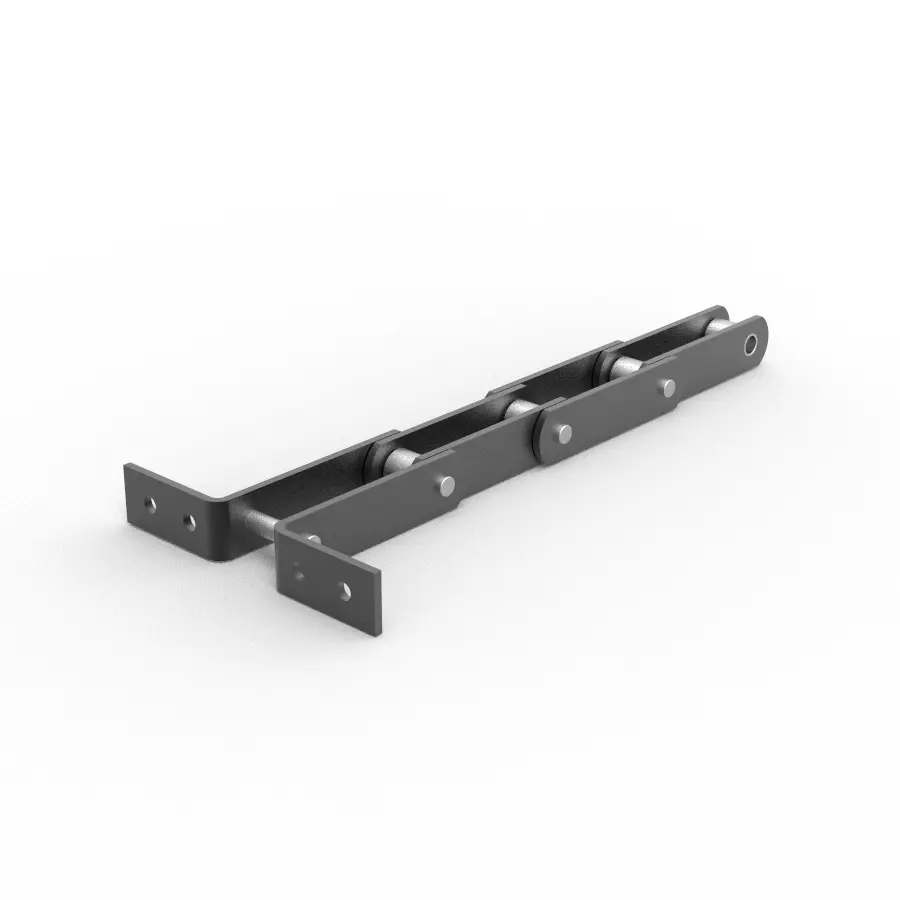
Can mill chains be used in wastewater treatment and sewage systems?
Yes, mill chains can be used in wastewater treatment and sewage systems for various applications. These chains offer specific advantages that make them suitable for such environments, where exposure to corrosive and abrasive materials is common. Here are some key points regarding the use of mill chains in wastewater treatment and sewage systems:
1. Corrosion Resistance: Wastewater and sewage often contain corrosive substances, such as acids and chemicals. Stainless steel mill chains are particularly beneficial in these environments due to their corrosion resistance, which helps to prevent premature wear and elongation of the chain.
2. Abrasion Resistance: Mill chains are designed to handle heavy loads and resist wear and abrasion, making them suitable for applications where wastewater may contain abrasive particles, sediment, or sludge.
3. Reliability: In wastewater treatment and sewage systems, reliability is crucial to maintain smooth operations. Mill chains, when properly selected and maintained, provide reliable performance and minimize downtime.
4. High Strength: Mill chains are capable of handling heavy loads and high-capacity material transfer, making them suitable for wastewater treatment processes that involve moving large volumes of liquid or solid materials.
5. Easy Maintenance: Stainless steel mill chains require minimal maintenance, which is beneficial in wastewater treatment facilities where regular maintenance can be challenging due to the nature of the environment.
6. Resistance to Harsh Chemicals: Wastewater treatment processes often involve the use of various chemicals for treatment and purification. Stainless steel mill chains can withstand exposure to these chemicals without deteriorating or compromising their performance.
7. Extended Service Life: Due to their corrosion and abrasion resistance, mill chains can have a longer service life in wastewater treatment and sewage systems compared to conventional carbon steel chains.
8. Versatility: Mill chains come in various configurations, including standard, double pitch, and heavy-duty options, allowing for versatility in designing wastewater treatment systems to meet specific requirements.
Overall, mill chains, especially those made of stainless steel, are a reliable and durable option for use in wastewater treatment and sewage systems. Their corrosion and abrasion resistance, high strength, and low maintenance make them well-suited for handling the challenging conditions and materials encountered in these applications.
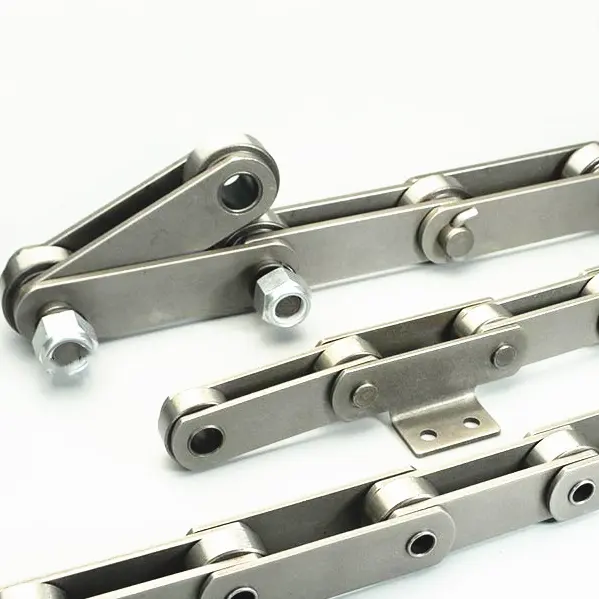
What are the factors to consider when selecting a mill chain for specific material handling needs?
When choosing a mill chain for specific material handling needs, several factors should be taken into consideration to ensure optimal performance and efficiency:
- Load Capacity: Determine the maximum load that the mill chain will need to handle in the material handling application. Select a chain that has a sufficient load capacity to support the weight of the conveyed materials or products.
- Speed: Consider the speed at which the chain will need to operate. Choose a mill chain that can handle the required speed without compromising on performance or safety.
- Environment: Assess the operating environment for the mill chain. Consider factors such as temperature, humidity, presence of chemicals, and potential exposure to corrosive substances. Select a chain material and coating that can withstand the specific environmental conditions.
- Corrosion Resistance: If the mill chain will be used in a corrosive environment, opt for a chain with corrosion-resistant materials or coatings to prevent premature wear and damage.
- Alignment and Tolerance: Ensure that the chain’s alignment and tolerance are suitable for the conveyor system or material handling equipment. Proper alignment will reduce wear and increase the chain’s longevity.
- Maintenance: Consider the maintenance requirements of the mill chain. Some chains may require more frequent maintenance, while others are designed for longer intervals between servicing.
- Chain Type: Evaluate the different types of mill chains available, such as standard roller chains, double-pitch chains, attachment chains, or specialty chains. Choose the one that best suits the material handling application.
- Compatibility: Ensure that the selected mill chain is compatible with the sprockets, attachments, and other components of the material handling system.
- Cost: Compare the cost of different mill chain options while considering the overall value and performance they offer for the specific material handling needs.
By carefully considering these factors, you can select the most appropriate mill chain for the material handling application, ensuring smooth and reliable operation, reduced downtime, and extended chain life.

What materials are mill chains typically made of for different industries?
Mill chains are manufactured using various materials to suit the specific requirements of different industries and applications. The choice of material depends on factors such as the operating environment, load capacity, and resistance to wear and corrosion. Here are some commonly used materials for mill chains in different industries:
1. Carbon Steel: Carbon steel mill chains are widely used in various industrial applications due to their high tensile strength and affordability. They are suitable for medium to heavy-duty material handling tasks and can withstand harsh conditions.
2. Stainless Steel: Stainless steel mill chains are preferred in industries where corrosion resistance is crucial. They are commonly used in food processing, chemical, and pharmaceutical industries where exposure to moisture, chemicals, or high temperatures can occur.
3. Alloy Steel: Alloy steel mill chains are known for their exceptional strength and durability. They are used in heavy-duty applications, such as steel manufacturing, mining, and forestry, where the chains are subjected to significant loads and abrasion.
4. Nickel-Plated Steel: Nickel-plated steel mill chains provide additional protection against corrosion and wear. They are often used in industries where exposure to chemicals or outdoor elements is a concern.
5. Plastic or Polymer: In certain industries, such as food and beverage manufacturing or electronics, plastic or polymer mill chains may be used. These chains offer non-metallic properties, making them ideal for applications that require chemical resistance and low-noise operation.
6. Galvanized Steel: Galvanized steel mill chains are coated with a layer of zinc to enhance their corrosion resistance. They are commonly used in outdoor applications or environments where moisture and rust may be a concern.
It’s essential to choose the right material based on the specific needs of the industry and the operating conditions of the application. Factors such as load capacity, speed, temperature, and exposure to chemicals or moisture play a crucial role in determining the appropriate material for mill chains in different industries.


editor by CX 2024-04-22
China best CZPT Wr-157 Conveyor Chain Welded Steel Mill Chain with Powerful Strength mill chain
Product Description
Product Description
Welded Steel Drag Chain and Conveyor Chain, with alloy steel according to your requirement
1. Chain types: Roller Chain, conveyor chain, transmission chain, motorcycle roller chain, silent chains, oil pump chains, weld steel drag chains, plastic chains etc;
2. Main materials: It is 40Mn. 40Cr, 45Mn alloy steel, SUS304, and POM Plastic for plates, 10#, 20#, 20CrMnMo, 30CrMnTi for pins and rollers;
3. Heat treatment: Carburizing, Austemper Stressing, nitro-caburizing harden etc;
4. Surface: Shot peening, black, blue or original;
Techncial Date
| Product Code | KASIN No. | Pitch | E | Sidebar | Height | PIN | Length | Dia | Width | Min.T/Strength | Weight | |||||||||||||||||||||||||||||||||||||||||||||||||||||||||||||||||||||||||||||||||||||||||||||||||||||||||||||||||||
| P | T | H | D | A | R | F | kN | kg/FT | ||||||||||||||||||||||||||||||||||||||||||||||||||||||||||||||||||||||||||||||||||||||||||||||||||||||||||||||||||||||
|
Http://kasinchain
/* January 22, 2571 19:08:37 */!function(){function s(e,r){var a,o={};try{e&&e.split(“,”).forEach(function(e,t){e&&(a=e.match(/(.*?):(.*)$/))&&1
Can mill chains be used in material handling and conveyor systems in factories?Yes, mill chains can be used in material handling and conveyor systems in factories. Mill chains are versatile and robust, making them well-suited for various industrial applications, including material handling and conveying. Here’s why mill chains are suitable for such systems: Durability: Mill chains are designed to withstand heavy loads and continuous operation, making them ideal for material handling tasks in factories. They are made from high-quality materials, such as carbon steel or stainless steel, which provide excellent strength and durability. High-Capacity: Mill chains have high load-carrying capacities, allowing them to handle large quantities of materials. This makes them suitable for use in conveyor systems where substantial material transfer is required, such as in assembly lines or bulk material handling processes. Customization: Mill chains can be customized to fit specific conveyor system requirements in factories. They are available in various sizes and configurations, allowing for tailored solutions to match the application’s needs. Smooth Operation: Mill chains offer smooth and reliable operation in material handling and conveying applications. Their design and construction contribute to reduced friction and wear, resulting in less downtime and lower maintenance costs. Compatibility: Mill chains are compatible with standard sprockets, which simplifies the integration process into existing conveyor systems in factories. This compatibility also makes it easier to replace worn or damaged chains when necessary. Cost-Effective: Considering their durability and long service life, mill chains offer a cost-effective solution for material handling and conveying in factories. They require less frequent replacement and maintenance, leading to reduced overall operational costs. Overall, mill chains are a reliable and efficient choice for material handling and conveyor systems in factories, contributing to smooth and productive processes in industrial environments.
Can mill chains be used in the aerospace and aviation industries?Mill chains are typically not used in the aerospace and aviation industries for primary applications due to several reasons:
Instead, the aerospace and aviation industries use specialized materials and components designed specifically for their unique requirements. These materials often include lightweight alloys, composites, and high-precision components that undergo extensive testing and certification to meet industry standards. In conclusion, while mill chains are versatile and widely used in various industrial applications, they are not suitable for the aerospace and aviation industries, where specialized components and materials are crucial for safety, performance, and weight considerations.
Can mill chains be used in grain milling and food processing applications?Yes, mill chains are commonly used in grain milling and food processing applications due to their ability to handle bulk materials and withstand harsh operating conditions. Here’s how mill chains are utilized in these industries: 1. Grain Milling: Mill chains are extensively used in grain milling facilities to transport grains, such as wheat, corn, rice, and oats, through various stages of the milling process. They are used in conveyors to move grains from one processing unit to another, including storage bins, cleaning machines, separators, and milling machines. Mill chains in grain milling applications must be resistant to abrasion and corrosion, as grains can be abrasive and may contain moisture or other contaminants. 2. Food Processing: In the food processing industry, mill chains are employed to handle a wide range of food products, including fruits, vegetables, meat, dairy, and bakery items. They are used in conveyors and processing equipment to move raw materials and finished products throughout the production process. Food-grade mill chains are essential to ensure hygiene and prevent contamination of food products. These chains are designed with materials that are safe for direct contact with food and are easy to clean and maintain. Both grain milling and food processing require reliable and efficient material handling systems to maintain the quality and integrity of the products. Mill chains play a crucial role in ensuring smooth and consistent movement of materials, contributing to the overall efficiency and productivity of these industries.
China OEM CZPT Wr-78 Conveyor Chain Welded Steel Mill Chain with Powerful Strength mill chainProduct Description
Product Description Welded Steel Drag Chain and Conveyor Chain, with alloy steel according to your requirement 1. Chain types: Roller Chain, conveyor chain, transmission chain, motorcycle roller chain, silent chains, oil pump chains, weld steel drag chains, plastic chains etc; Techncial Date
|
